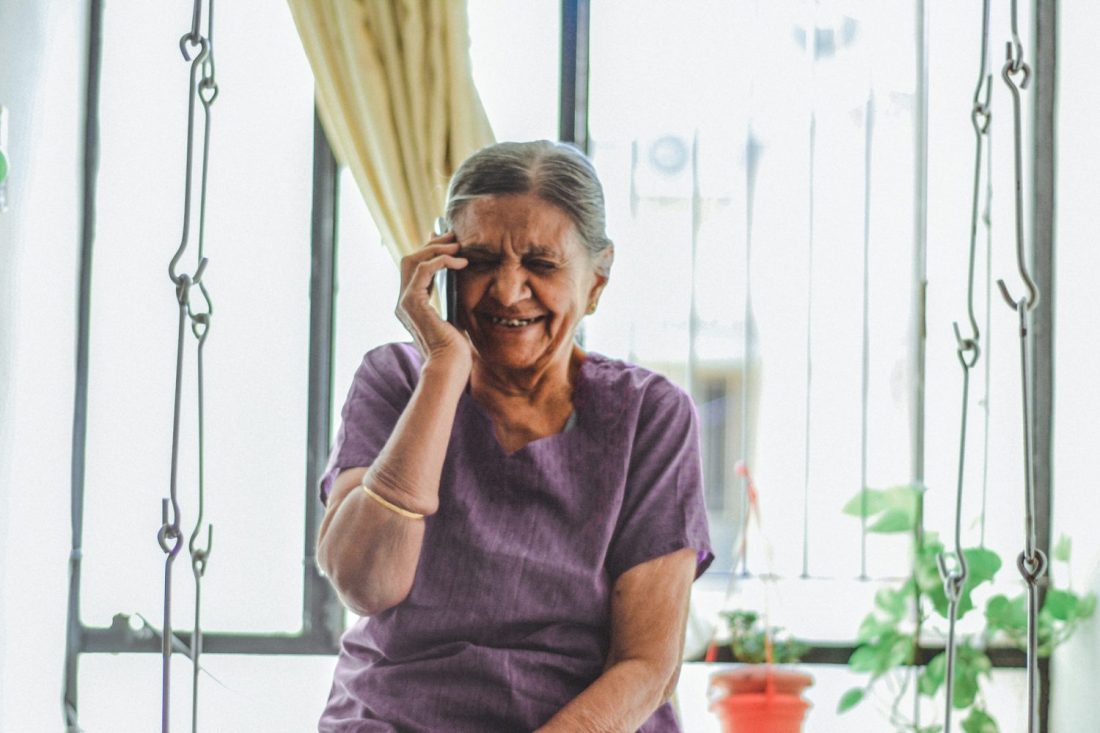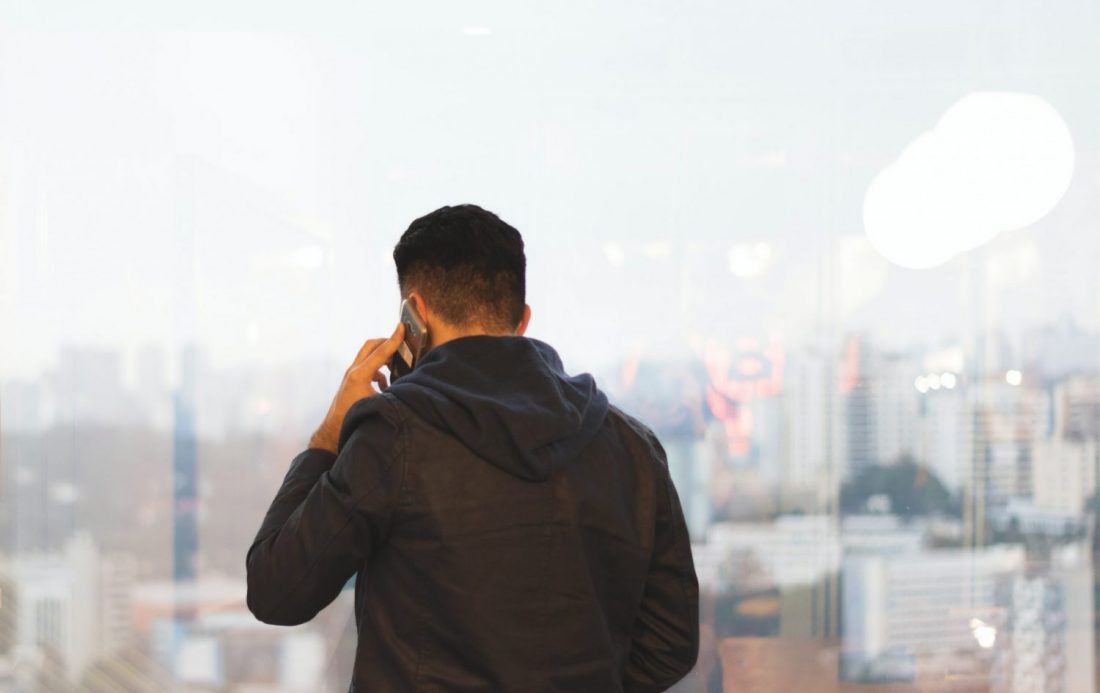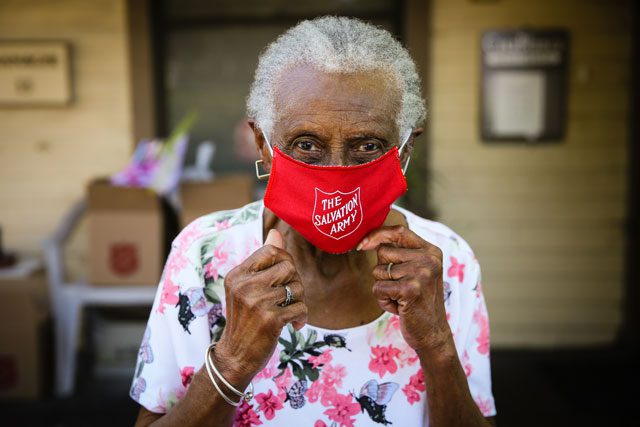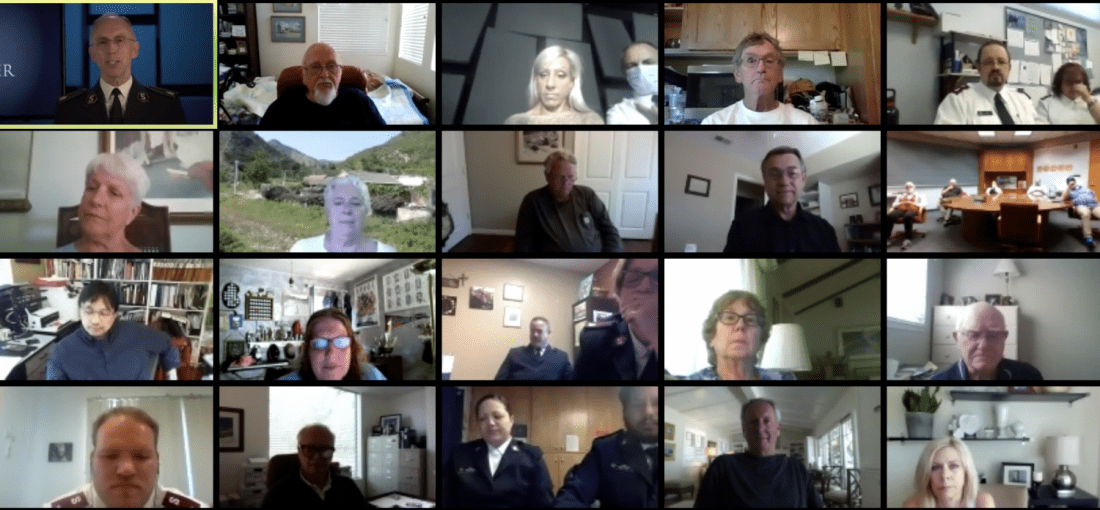Listen to this article
Listen to this article
Loading
Play
Pause
Options
0:00
-:--
1x
Playback Speed- 0.5
- 0.6
- 0.7
- 0.8
- 0.9
- 1
- 1.1
- 1.2
- 1.3
- 1.5
- 2
Audio Language
- English
- French
- German
- Italian
- Spanish
Open text
‘daily word of peace’ call helps people feel less alone. by caitlin johnston–. it all started with a desire to help people feel less alone. as the novel coronavirus spread across the country, cities shut down one after another, leaving people confined to their homes. for some, that meant a full house with kids, siblings, spouses and every other iteration of family. but for those living at a silvercrest senior residence center, it meant retreating into their one-bedroom or studio apartments. “when the covid-19 crisis first started, i realized one of the big issues would be the isolation that our residents will encounter,” said susan lawrence, executive director of silvercrest management. “we’re not just providing housing for people. we’re concerned about the wholeness of them. their health, their well being and their spiritual concerns as well.”. with stay-at-home orders in place, the normal bustle of the centers is gone. no more visitors. no music in the foyer or prayer groups or game nights. lawrence knew she couldn’t care for her residents’ emotional and mental health with the same face-to-face manner anymore. but she could call them. lawrence and a team asked residents if they would like to receive regular phone calls from a staff member. they checked in, chatted about life, shared stories and tried to spread a smile. captain joshua sneed, the senior residence ministries coordinator for the salvation army’s california south division, joined the efforts. along with cadets and other volunteers, they called as many residents as they could. but even with an expanded team, there’s only so many people they can call each day, on top of all the other duties of the day. that’s when sneed came up with the idea of an automated call. once a day, people who register get a 90-second call. it’s sneed’s voice on the other line. “this is your daily word of peace,” sneed starts off each day, light guitar music strumming in the background. “in our prayers today, we’re looking to god for inspiration and guidance,” sneed said in one recording. his tone is soothing and conversational. he encourages them to share the phone number with those who might benefit from it. if you’re feeling alone, call the salvation army. if you’re scared, lonely or dealing with uncertainty, dial 844-458-hope (4673). if you’d like to subscribe to the daily word of peace, call 855-697-4570. “we thank you so much for being a part of our salvation army family,” he says in another. “we’re praying for you every day.”. if you have a prayer request or want to call him back, he leaves a number: 855-697-4570. “we’re looking at how we can help people replace what was lost,” sneed said. “this phone call is a layer on top of that. it’s a way to make sure you hear a voice every day and that you know what day it is. i can’t stress how important that is.”. dr. patrick arbore, director of the institute of aging’s center for elderly suicide prevention and founder of the friendship line, said reducing loneliness and social isolation has a direct impact on reducing depression and suicidal isolation. “i think older people really need the contact,” said arbore, who noted that calls on the friendship line for seniors have nearly doubled during the pandemic. “it’s in our dna. we need other people. we need to feel connected.”. sneed misses seeing the residents he’s come to know so well. he misses the daily exchanges of smiles and hugs and conversation. though he no longer can bring his guitar and sing hank williams and the beatles for the residents, or lead a chapel service, he knew he could still connect with people. nancy mcpherson, state director for aarp california, said it’s important for any outreach during this difficult time to have consistency. the nice thing about the daily word of peace calls, she said, is that they come from an organization that the individuals in silvercrests already had a connection with prior to covid-19 and will stay connected with after. “we hope that programs that are putting something in place are really taking into consideration the effect on somebody who would have something like this pulled out from under them once covid is over,” mcpherson said. “i think that staying power is really important.”. sneed said he plans to keep the phone calls going once coronavirus restrictions are lifted. “it serves a need, regardless of what is going on in the world,” he said. while many older individuals are adept with new technology, relying on the phone as a way to connect is a greater unifier. “if we’re saying to people, we want you to use zoom or facetime or other virtual connections, but we haven’t been able to show people how to do that, it’s really difficult,” mcpherson said. “initially, we’re talking about the millions of people who are in facilities or living quietly in their own personal home. the phone is a really good way to get started with people.”. ultimately, the goal of the calls is to let people know they are not alone during this crisis, said sarah bentley, a staff member at the salvation army’s western territory headquarters. even before covid-19, isolation was listed as a serious health problem in older adults, bentley said. “so imagine what’s happening now,” she said. “their situation is magnified.”. bentley helped set-up the silver line in march to connect with seniors and give them a chance to talk about their daily lives and voice anxious thoughts and fears. the automated daily word of peace call is another service to layer on top of that and help wrap people in support and connection. “when i have asked if they would like a call with scripture, prayer, they have been more than willing to receive a call,” bentley said. “it’s another touch point, another connection to hear a voice. someone cares.”. sneed also noted that the daily word of peace calls are in addition to, not a replacement of the silver line. “we know isolation can be so devastating for our folks,” sneed said. “we want to make sure that we can encourage them along the way. this is just another way the salvation army can encourage our seniors who are at home.”. one benefit of the robocall is that it essentially costs the salvation army nothing, sneed said. the robocall service is $20 a month, and it’s free for him to put it online as a podcast. “we don’t have to spend a lot of money to make a difference in people’s lives,” sneed said. “we just have to be there for them.”. how to help:. if you’d like to make a monetary donation, pleaseclick here to make a gift. text ‘give’ to 52000 to make a $10 donation to the salvation army. this will automatically add a one-time donation to your next mobile phone bill. for information about volunteering, please visitvolunteer.usawest.org. to learn more about how to support the salvation army’s relief efforts,please click here.
Open context player
Close context player
Plays:-Audio plays count
‘daily word of peace’ call helps people feel less alone. by caitlin johnston–. it all started with a desire to help people feel less alone. as the novel coronavirus spread across the country, cities shut down one after another, leaving people confined to their homes. for some, that meant a full house with kids, siblings, spouses and every other iteration of family. but for those living at a silvercrest senior residence center, it meant retreating into their one-bedroom or studio apartments. “when the covid-19 crisis first started, i realized one of the big issues would be the isolation that our residents will encounter,” said susan lawrence, executive director of silvercrest management. “we’re not just providing housing for people. we’re concerned about the wholeness of them. their health, their well being and their spiritual concerns as well.”. with stay-at-home orders in place, the normal bustle of the centers is gone. no more visitors. no music in the foyer or prayer groups or game nights. lawrence knew she couldn’t care for her residents’ emotional and mental health with the same face-to-face manner anymore. but she could call them. lawrence and a team asked residents if they would like to receive regular phone calls from a staff member. they checked in, chatted about life, shared stories and tried to spread a smile. captain joshua sneed, the senior residence ministries coordinator for the salvation army’s california south division, joined the efforts. along with cadets and other volunteers, they called as many residents as they could. but even with an expanded team, there’s only so many people they can call each day, on top of all the other duties of the day. that’s when sneed came up with the idea of an automated call. once a day, people who register get a 90-second call. it’s sneed’s voice on the other line. “this is your daily word of peace,” sneed starts off each day, light guitar music strumming in the background. “in our prayers today, we’re looking to god for inspiration and guidance,” sneed said in one recording. his tone is soothing and conversational. he encourages them to share the phone number with those who might benefit from it. if you’re feeling alone, call the salvation army. if you’re scared, lonely or dealing with uncertainty, dial 844-458-hope (4673). if you’d like to subscribe to the daily word of peace, call 855-697-4570. “we thank you so much for being a part of our salvation army family,” he says in another. “we’re praying for you every day.”. if you have a prayer request or want to call him back, he leaves a number: 855-697-4570. “we’re looking at how we can help people replace what was lost,” sneed said. “this phone call is a layer on top of that. it’s a way to make sure you hear a voice every day and that you know what day it is. i can’t stress how important that is.”. dr. patrick arbore, director of the institute of aging’s center for elderly suicide prevention and founder of the friendship line, said reducing loneliness and social isolation has a direct impact on reducing depression and suicidal isolation. “i think older people really need the contact,” said arbore, who noted that calls on the friendship line for seniors have nearly doubled during the pandemic. “it’s in our dna. we need other people. we need to feel connected.”. sneed misses seeing the residents he’s come to know so well. he misses the daily exchanges of smiles and hugs and conversation. though he no longer can bring his guitar and sing hank williams and the beatles for the residents, or lead a chapel service, he knew he could still connect with people. nancy mcpherson, state director for aarp california, said it’s important for any outreach during this difficult time to have consistency. the nice thing about the daily word of peace calls, she said, is that they come from an organization that the individuals in silvercrests already had a connection with prior to covid-19 and will stay connected with after. “we hope that programs that are putting something in place are really taking into consideration the effect on somebody who would have something like this pulled out from under them once covid is over,” mcpherson said. “i think that staying power is really important.”. sneed said he plans to keep the phone calls going once coronavirus restrictions are lifted. “it serves a need, regardless of what is going on in the world,” he said. while many older individuals are adept with new technology, relying on the phone as a way to connect is a greater unifier. “if we’re saying to people, we want you to use zoom or facetime or other virtual connections, but we haven’t been able to show people how to do that, it’s really difficult,” mcpherson said. “initially, we’re talking about the millions of people who are in facilities or living quietly in their own personal home. the phone is a really good way to get started with people.”. ultimately, the goal of the calls is to let people know they are not alone during this crisis, said sarah bentley, a staff member at the salvation army’s western territory headquarters. even before covid-19, isolation was listed as a serious health problem in older adults, bentley said. “so imagine what’s happening now,” she said. “their situation is magnified.”. bentley helped set-up the silver line in march to connect with seniors and give them a chance to talk about their daily lives and voice anxious thoughts and fears. the automated daily word of peace call is another service to layer on top of that and help wrap people in support and connection. “when i have asked if they would like a call with scripture, prayer, they have been more than willing to receive a call,” bentley said. “it’s another touch point, another connection to hear a voice. someone cares.”. sneed also noted that the daily word of peace calls are in addition to, not a replacement of the silver line. “we know isolation can be so devastating for our folks,” sneed said. “we want to make sure that we can encourage them along the way. this is just another way the salvation army can encourage our seniors who are at home.”. one benefit of the robocall is that it essentially costs the salvation army nothing, sneed said. the robocall service is $20 a month, and it’s free for him to put it online as a podcast. “we don’t have to spend a lot of money to make a difference in people’s lives,” sneed said. “we just have to be there for them.”. how to help:. if you’d like to make a monetary donation, pleaseclick here to make a gift. text ‘give’ to 52000 to make a $10 donation to the salvation army. this will automatically add a one-time donation to your next mobile phone bill. for information about volunteering, please visitvolunteer.usawest.org. to learn more about how to support the salvation army’s relief efforts,please click here.
Listen to this article














